Case Study: Legal Principles, Ethical Issues, and Patient Consent
VerifiedAdded on 2022/09/09
|14
|3398
|48
Case Study
AI Summary
This case study examines the legal and ethical issues arising when a patient, Ross, loses decision-making capacity. The analysis explores the principles of beneficence, nonmaleficence, and substituted judgment, highlighting the importance of informed consent and patient autonomy. The study delves into legal frameworks, including the Guardianship and Administration Act 2000, and the role of substitute decision-makers like Ross's wife, Rachel. It addresses potential disagreements among family members and healthcare professionals regarding treatment options, emphasizing the need for clear communication and adherence to ethical guidelines. The case considers the legal implications of providing or withholding treatment, especially in end-of-life scenarios, and the importance of balancing patient interests with legal obligations. The analysis incorporates the Universal Declaration on Bioethics and Human Rights, focusing on the protection of patients' rights and the ethical considerations surrounding medical interventions. The case underscores the complexities of healthcare decision-making and the critical need for ethical and legal compliance.
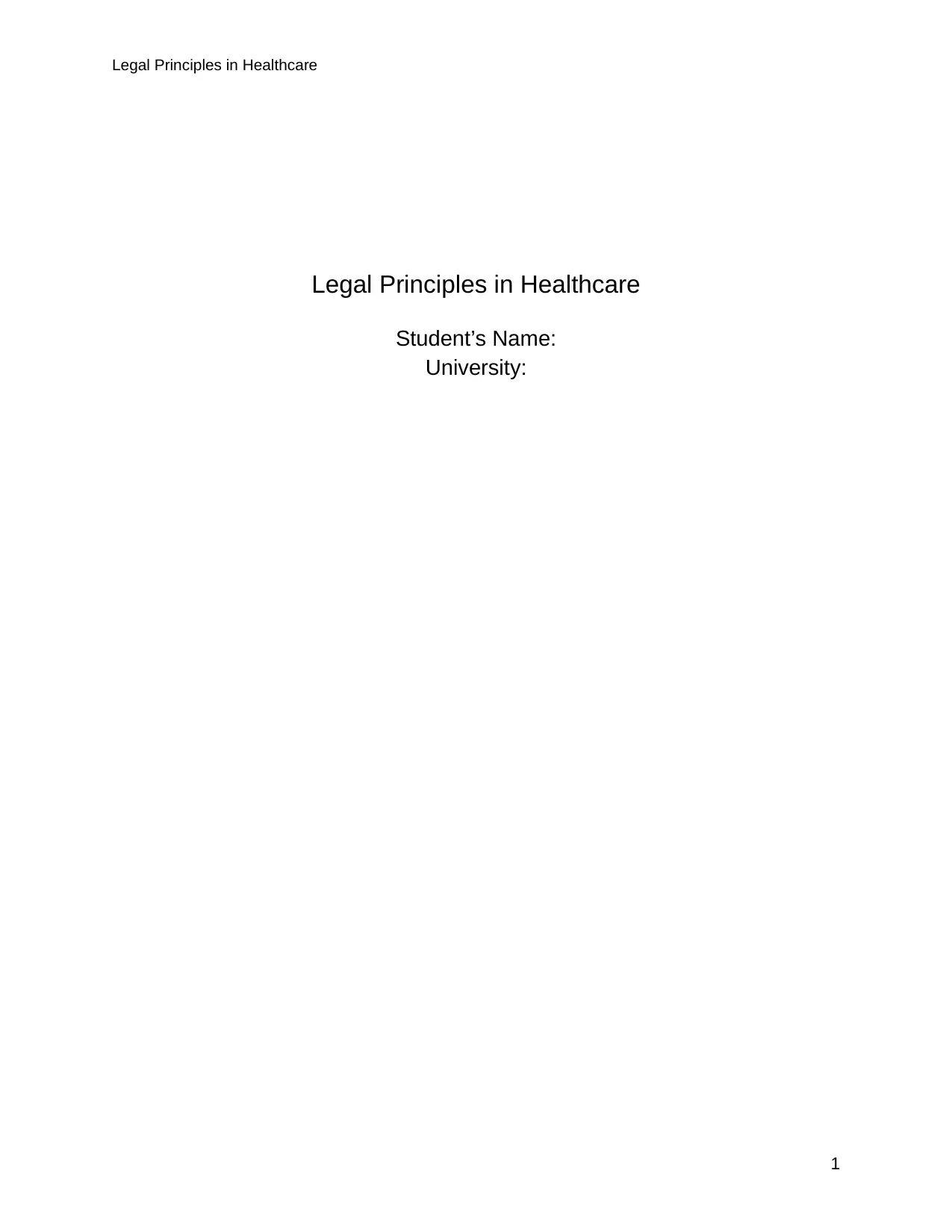
Legal Principles in Healthcare
Legal Principles in Healthcare
Student’s Name:
University:
1
Legal Principles in Healthcare
Student’s Name:
University:
1
Secure Best Marks with AI Grader
Need help grading? Try our AI Grader for instant feedback on your assignments.
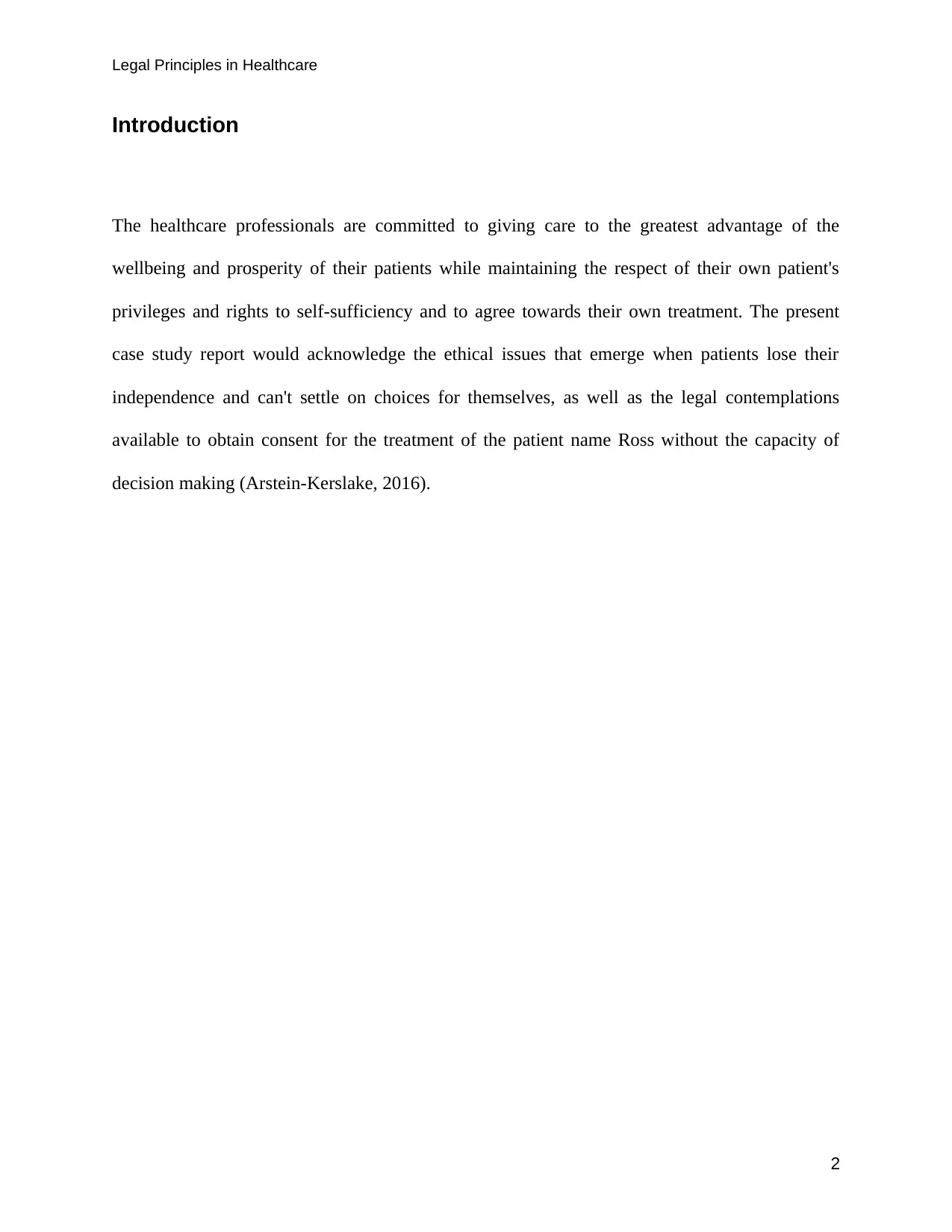
Legal Principles in Healthcare
Introduction
The healthcare professionals are committed to giving care to the greatest advantage of the
wellbeing and prosperity of their patients while maintaining the respect of their own patient's
privileges and rights to self-sufficiency and to agree towards their own treatment. The present
case study report would acknowledge the ethical issues that emerge when patients lose their
independence and can't settle on choices for themselves, as well as the legal contemplations
available to obtain consent for the treatment of the patient name Ross without the capacity of
decision making (Arstein-Kerslake, 2016).
2
Introduction
The healthcare professionals are committed to giving care to the greatest advantage of the
wellbeing and prosperity of their patients while maintaining the respect of their own patient's
privileges and rights to self-sufficiency and to agree towards their own treatment. The present
case study report would acknowledge the ethical issues that emerge when patients lose their
independence and can't settle on choices for themselves, as well as the legal contemplations
available to obtain consent for the treatment of the patient name Ross without the capacity of
decision making (Arstein-Kerslake, 2016).
2
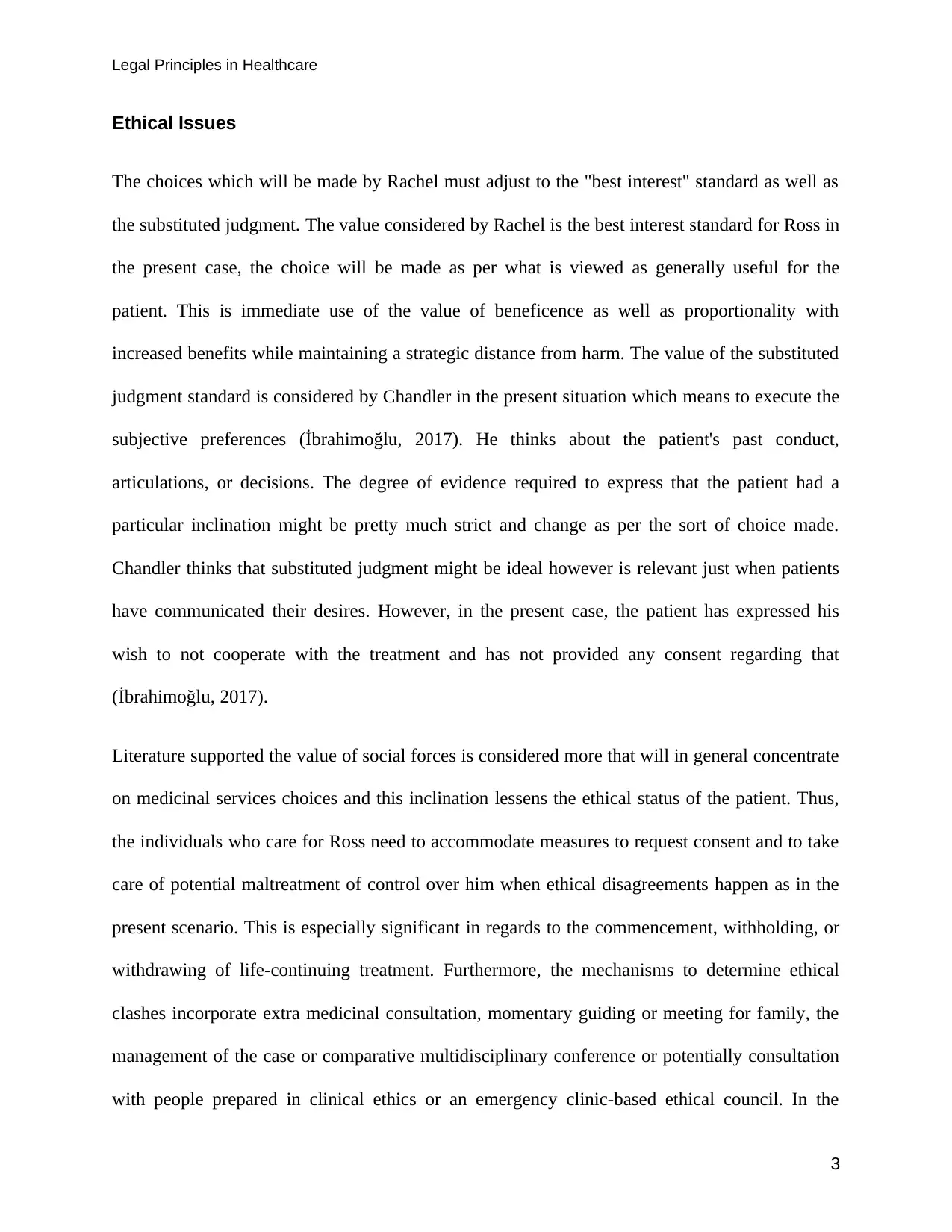
Legal Principles in Healthcare
Ethical Issues
The choices which will be made by Rachel must adjust to the "best interest" standard as well as
the substituted judgment. The value considered by Rachel is the best interest standard for Ross in
the present case, the choice will be made as per what is viewed as generally useful for the
patient. This is immediate use of the value of beneficence as well as proportionality with
increased benefits while maintaining a strategic distance from harm. The value of the substituted
judgment standard is considered by Chandler in the present situation which means to execute the
subjective preferences (İbrahimoğlu, 2017). He thinks about the patient's past conduct,
articulations, or decisions. The degree of evidence required to express that the patient had a
particular inclination might be pretty much strict and change as per the sort of choice made.
Chandler thinks that substituted judgment might be ideal however is relevant just when patients
have communicated their desires. However, in the present case, the patient has expressed his
wish to not cooperate with the treatment and has not provided any consent regarding that
(İbrahimoğlu, 2017).
Literature supported the value of social forces is considered more that will in general concentrate
on medicinal services choices and this inclination lessens the ethical status of the patient. Thus,
the individuals who care for Ross need to accommodate measures to request consent and to take
care of potential maltreatment of control over him when ethical disagreements happen as in the
present scenario. This is especially significant in regards to the commencement, withholding, or
withdrawing of life-continuing treatment. Furthermore, the mechanisms to determine ethical
clashes incorporate extra medicinal consultation, momentary guiding or meeting for family, the
management of the case or comparative multidisciplinary conference or potentially consultation
with people prepared in clinical ethics or an emergency clinic-based ethical council. In the
3
Ethical Issues
The choices which will be made by Rachel must adjust to the "best interest" standard as well as
the substituted judgment. The value considered by Rachel is the best interest standard for Ross in
the present case, the choice will be made as per what is viewed as generally useful for the
patient. This is immediate use of the value of beneficence as well as proportionality with
increased benefits while maintaining a strategic distance from harm. The value of the substituted
judgment standard is considered by Chandler in the present situation which means to execute the
subjective preferences (İbrahimoğlu, 2017). He thinks about the patient's past conduct,
articulations, or decisions. The degree of evidence required to express that the patient had a
particular inclination might be pretty much strict and change as per the sort of choice made.
Chandler thinks that substituted judgment might be ideal however is relevant just when patients
have communicated their desires. However, in the present case, the patient has expressed his
wish to not cooperate with the treatment and has not provided any consent regarding that
(İbrahimoğlu, 2017).
Literature supported the value of social forces is considered more that will in general concentrate
on medicinal services choices and this inclination lessens the ethical status of the patient. Thus,
the individuals who care for Ross need to accommodate measures to request consent and to take
care of potential maltreatment of control over him when ethical disagreements happen as in the
present scenario. This is especially significant in regards to the commencement, withholding, or
withdrawing of life-continuing treatment. Furthermore, the mechanisms to determine ethical
clashes incorporate extra medicinal consultation, momentary guiding or meeting for family, the
management of the case or comparative multidisciplinary conference or potentially consultation
with people prepared in clinical ethics or an emergency clinic-based ethical council. In the
3
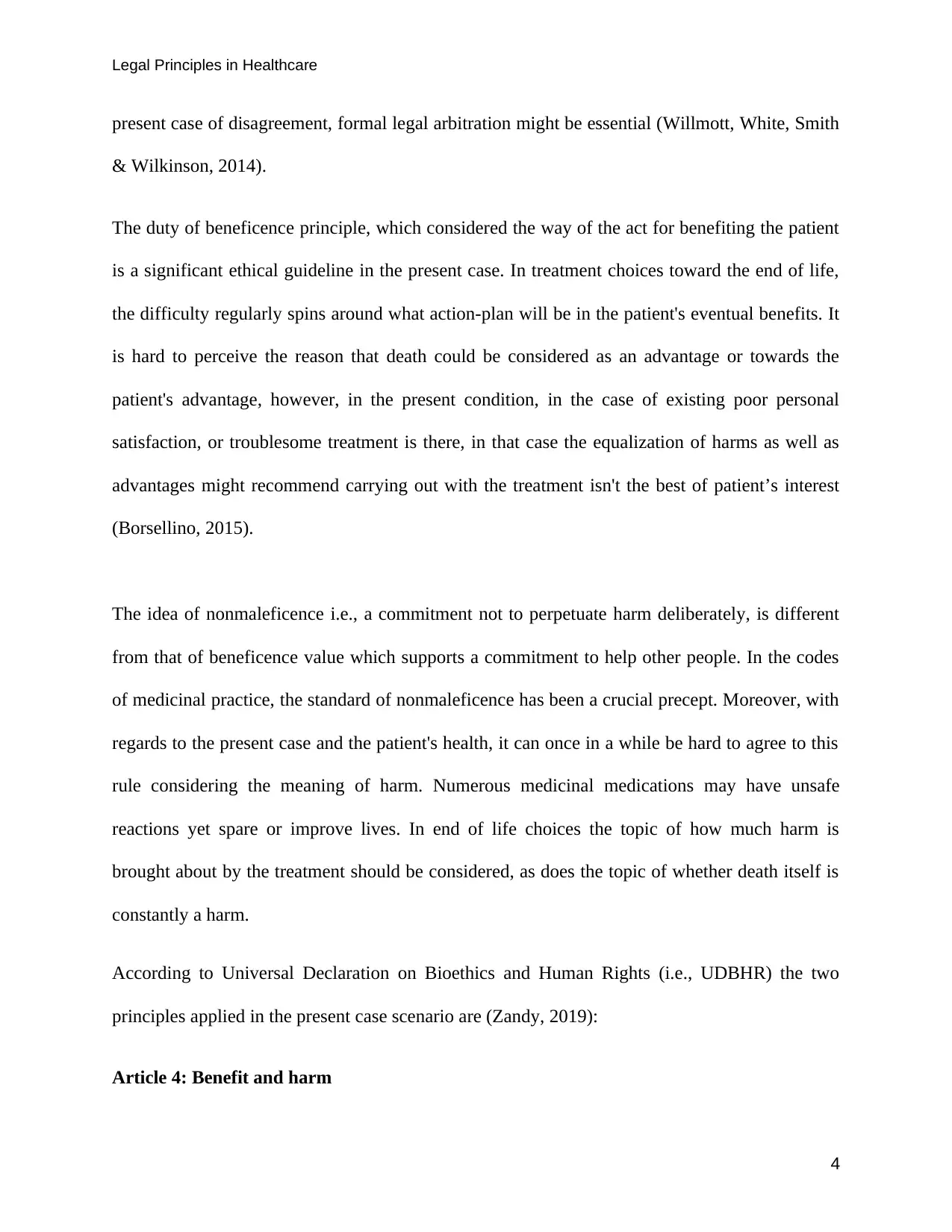
Legal Principles in Healthcare
present case of disagreement, formal legal arbitration might be essential (Willmott, White, Smith
& Wilkinson, 2014).
The duty of beneficence principle, which considered the way of the act for benefiting the patient
is a significant ethical guideline in the present case. In treatment choices toward the end of life,
the difficulty regularly spins around what action-plan will be in the patient's eventual benefits. It
is hard to perceive the reason that death could be considered as an advantage or towards the
patient's advantage, however, in the present condition, in the case of existing poor personal
satisfaction, or troublesome treatment is there, in that case the equalization of harms as well as
advantages might recommend carrying out with the treatment isn't the best of patient’s interest
(Borsellino, 2015).
The idea of nonmaleficence i.e., a commitment not to perpetuate harm deliberately, is different
from that of beneficence value which supports a commitment to help other people. In the codes
of medicinal practice, the standard of nonmaleficence has been a crucial precept. Moreover, with
regards to the present case and the patient's health, it can once in a while be hard to agree to this
rule considering the meaning of harm. Numerous medicinal medications may have unsafe
reactions yet spare or improve lives. In end of life choices the topic of how much harm is
brought about by the treatment should be considered, as does the topic of whether death itself is
constantly a harm.
According to Universal Declaration on Bioethics and Human Rights (i.e., UDBHR) the two
principles applied in the present case scenario are (Zandy, 2019):
Article 4: Benefit and harm
4
present case of disagreement, formal legal arbitration might be essential (Willmott, White, Smith
& Wilkinson, 2014).
The duty of beneficence principle, which considered the way of the act for benefiting the patient
is a significant ethical guideline in the present case. In treatment choices toward the end of life,
the difficulty regularly spins around what action-plan will be in the patient's eventual benefits. It
is hard to perceive the reason that death could be considered as an advantage or towards the
patient's advantage, however, in the present condition, in the case of existing poor personal
satisfaction, or troublesome treatment is there, in that case the equalization of harms as well as
advantages might recommend carrying out with the treatment isn't the best of patient’s interest
(Borsellino, 2015).
The idea of nonmaleficence i.e., a commitment not to perpetuate harm deliberately, is different
from that of beneficence value which supports a commitment to help other people. In the codes
of medicinal practice, the standard of nonmaleficence has been a crucial precept. Moreover, with
regards to the present case and the patient's health, it can once in a while be hard to agree to this
rule considering the meaning of harm. Numerous medicinal medications may have unsafe
reactions yet spare or improve lives. In end of life choices the topic of how much harm is
brought about by the treatment should be considered, as does the topic of whether death itself is
constantly a harm.
According to Universal Declaration on Bioethics and Human Rights (i.e., UDBHR) the two
principles applied in the present case scenario are (Zandy, 2019):
Article 4: Benefit and harm
4
Secure Best Marks with AI Grader
Need help grading? Try our AI Grader for instant feedback on your assignments.
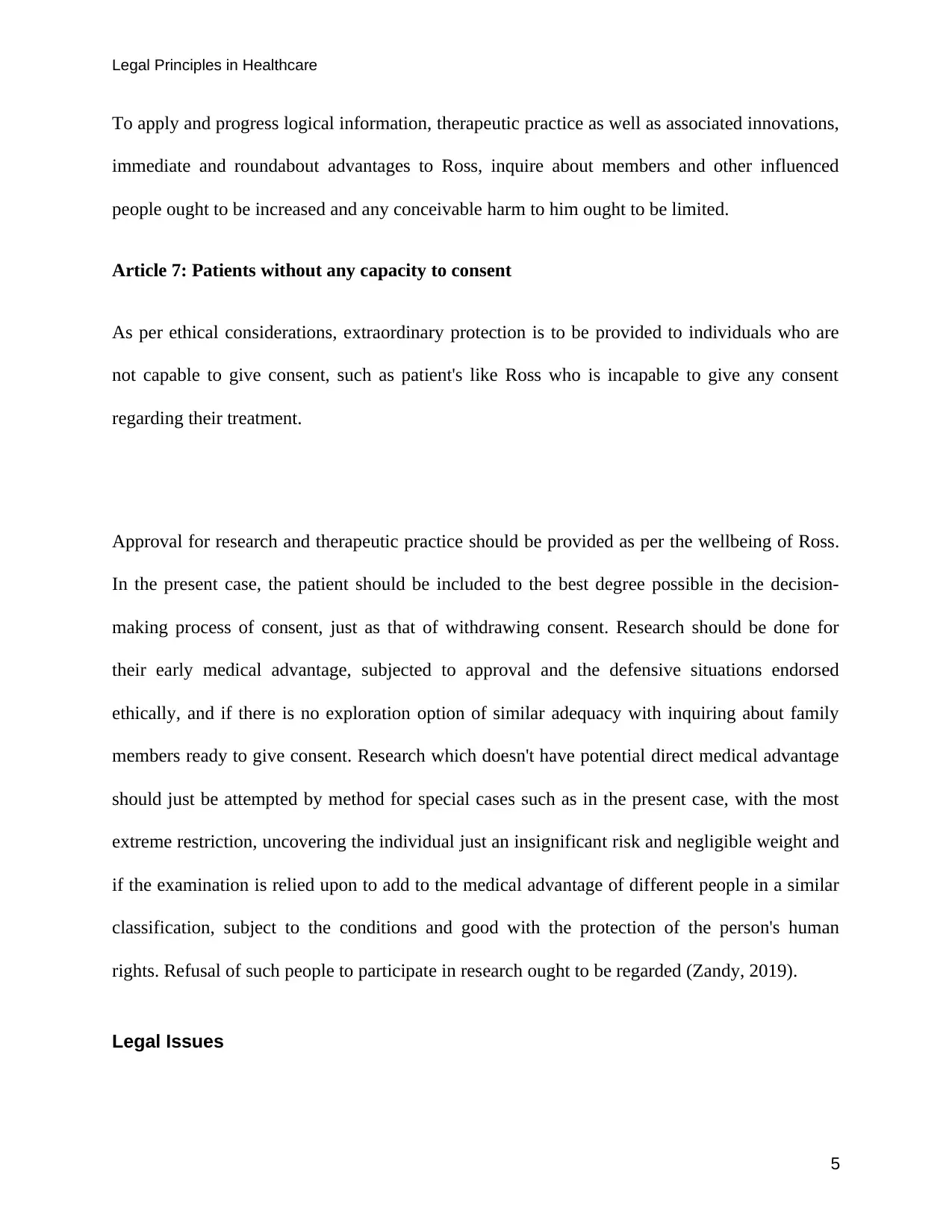
Legal Principles in Healthcare
To apply and progress logical information, therapeutic practice as well as associated innovations,
immediate and roundabout advantages to Ross, inquire about members and other influenced
people ought to be increased and any conceivable harm to him ought to be limited.
Article 7: Patients without any capacity to consent
As per ethical considerations, extraordinary protection is to be provided to individuals who are
not capable to give consent, such as patient's like Ross who is incapable to give any consent
regarding their treatment.
Approval for research and therapeutic practice should be provided as per the wellbeing of Ross.
In the present case, the patient should be included to the best degree possible in the decision-
making process of consent, just as that of withdrawing consent. Research should be done for
their early medical advantage, subjected to approval and the defensive situations endorsed
ethically, and if there is no exploration option of similar adequacy with inquiring about family
members ready to give consent. Research which doesn't have potential direct medical advantage
should just be attempted by method for special cases such as in the present case, with the most
extreme restriction, uncovering the individual just an insignificant risk and negligible weight and
if the examination is relied upon to add to the medical advantage of different people in a similar
classification, subject to the conditions and good with the protection of the person's human
rights. Refusal of such people to participate in research ought to be regarded (Zandy, 2019).
Legal Issues
5
To apply and progress logical information, therapeutic practice as well as associated innovations,
immediate and roundabout advantages to Ross, inquire about members and other influenced
people ought to be increased and any conceivable harm to him ought to be limited.
Article 7: Patients without any capacity to consent
As per ethical considerations, extraordinary protection is to be provided to individuals who are
not capable to give consent, such as patient's like Ross who is incapable to give any consent
regarding their treatment.
Approval for research and therapeutic practice should be provided as per the wellbeing of Ross.
In the present case, the patient should be included to the best degree possible in the decision-
making process of consent, just as that of withdrawing consent. Research should be done for
their early medical advantage, subjected to approval and the defensive situations endorsed
ethically, and if there is no exploration option of similar adequacy with inquiring about family
members ready to give consent. Research which doesn't have potential direct medical advantage
should just be attempted by method for special cases such as in the present case, with the most
extreme restriction, uncovering the individual just an insignificant risk and negligible weight and
if the examination is relied upon to add to the medical advantage of different people in a similar
classification, subject to the conditions and good with the protection of the person's human
rights. Refusal of such people to participate in research ought to be regarded (Zandy, 2019).
Legal Issues
5
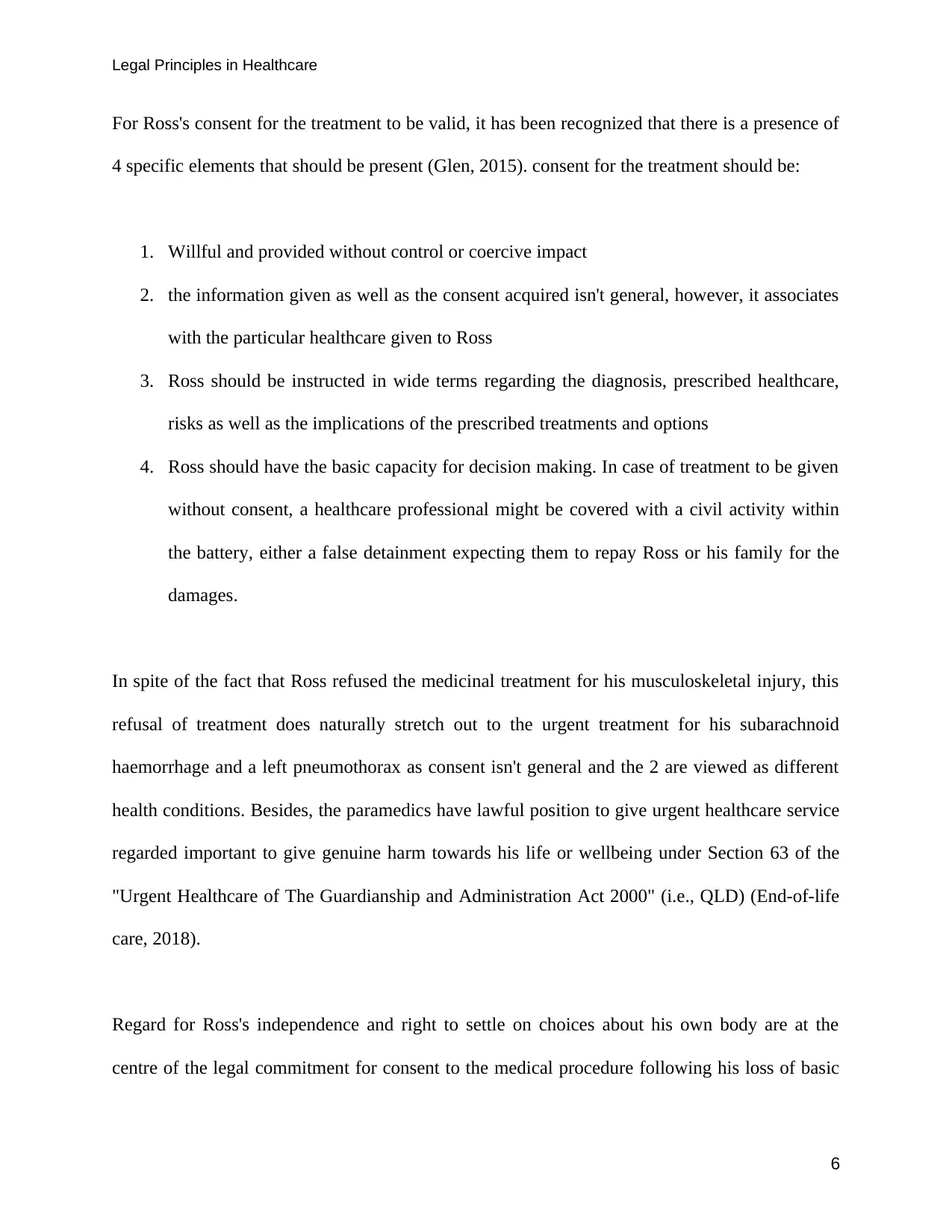
Legal Principles in Healthcare
For Ross's consent for the treatment to be valid, it has been recognized that there is a presence of
4 specific elements that should be present (Glen, 2015). consent for the treatment should be:
1. Willful and provided without control or coercive impact
2. the information given as well as the consent acquired isn't general, however, it associates
with the particular healthcare given to Ross
3. Ross should be instructed in wide terms regarding the diagnosis, prescribed healthcare,
risks as well as the implications of the prescribed treatments and options
4. Ross should have the basic capacity for decision making. In case of treatment to be given
without consent, a healthcare professional might be covered with a civil activity within
the battery, either a false detainment expecting them to repay Ross or his family for the
damages.
In spite of the fact that Ross refused the medicinal treatment for his musculoskeletal injury, this
refusal of treatment does naturally stretch out to the urgent treatment for his subarachnoid
haemorrhage and a left pneumothorax as consent isn't general and the 2 are viewed as different
health conditions. Besides, the paramedics have lawful position to give urgent healthcare service
regarded important to give genuine harm towards his life or wellbeing under Section 63 of the
"Urgent Healthcare of The Guardianship and Administration Act 2000" (i.e., QLD) (End-of-life
care, 2018).
Regard for Ross's independence and right to settle on choices about his own body are at the
centre of the legal commitment for consent to the medical procedure following his loss of basic
6
For Ross's consent for the treatment to be valid, it has been recognized that there is a presence of
4 specific elements that should be present (Glen, 2015). consent for the treatment should be:
1. Willful and provided without control or coercive impact
2. the information given as well as the consent acquired isn't general, however, it associates
with the particular healthcare given to Ross
3. Ross should be instructed in wide terms regarding the diagnosis, prescribed healthcare,
risks as well as the implications of the prescribed treatments and options
4. Ross should have the basic capacity for decision making. In case of treatment to be given
without consent, a healthcare professional might be covered with a civil activity within
the battery, either a false detainment expecting them to repay Ross or his family for the
damages.
In spite of the fact that Ross refused the medicinal treatment for his musculoskeletal injury, this
refusal of treatment does naturally stretch out to the urgent treatment for his subarachnoid
haemorrhage and a left pneumothorax as consent isn't general and the 2 are viewed as different
health conditions. Besides, the paramedics have lawful position to give urgent healthcare service
regarded important to give genuine harm towards his life or wellbeing under Section 63 of the
"Urgent Healthcare of The Guardianship and Administration Act 2000" (i.e., QLD) (End-of-life
care, 2018).
Regard for Ross's independence and right to settle on choices about his own body are at the
centre of the legal commitment for consent to the medical procedure following his loss of basic
6
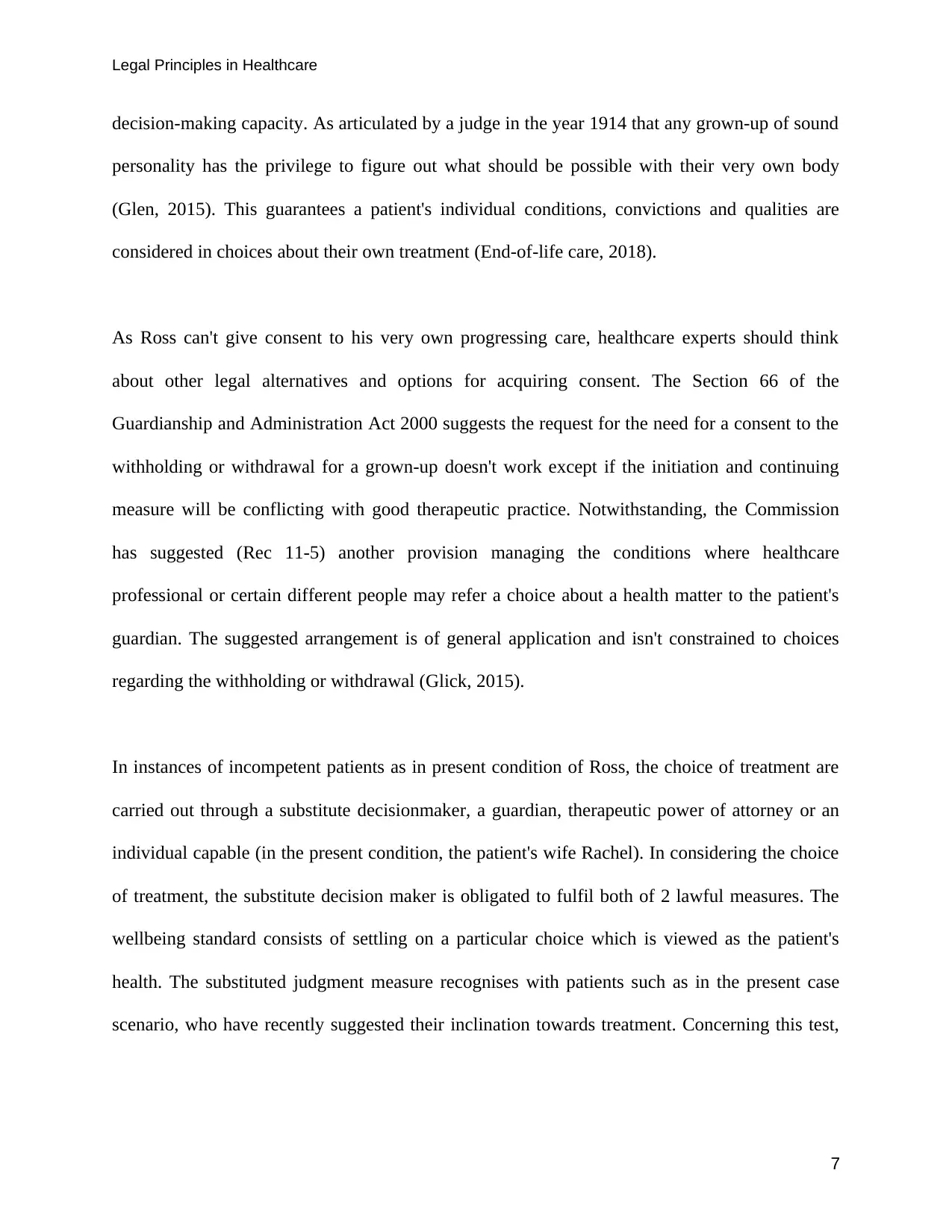
Legal Principles in Healthcare
decision-making capacity. As articulated by a judge in the year 1914 that any grown-up of sound
personality has the privilege to figure out what should be possible with their very own body
(Glen, 2015). This guarantees a patient's individual conditions, convictions and qualities are
considered in choices about their own treatment (End-of-life care, 2018).
As Ross can't give consent to his very own progressing care, healthcare experts should think
about other legal alternatives and options for acquiring consent. The Section 66 of the
Guardianship and Administration Act 2000 suggests the request for the need for a consent to the
withholding or withdrawal for a grown-up doesn't work except if the initiation and continuing
measure will be conflicting with good therapeutic practice. Notwithstanding, the Commission
has suggested (Rec 11-5) another provision managing the conditions where healthcare
professional or certain different people may refer a choice about a health matter to the patient's
guardian. The suggested arrangement is of general application and isn't constrained to choices
regarding the withholding or withdrawal (Glick, 2015).
In instances of incompetent patients as in present condition of Ross, the choice of treatment are
carried out through a substitute decisionmaker, a guardian, therapeutic power of attorney or an
individual capable (in the present condition, the patient's wife Rachel). In considering the choice
of treatment, the substitute decision maker is obligated to fulfil both of 2 lawful measures. The
wellbeing standard consists of settling on a particular choice which is viewed as the patient's
health. The substituted judgment measure recognises with patients such as in the present case
scenario, who have recently suggested their inclination towards treatment. Concerning this test,
7
decision-making capacity. As articulated by a judge in the year 1914 that any grown-up of sound
personality has the privilege to figure out what should be possible with their very own body
(Glen, 2015). This guarantees a patient's individual conditions, convictions and qualities are
considered in choices about their own treatment (End-of-life care, 2018).
As Ross can't give consent to his very own progressing care, healthcare experts should think
about other legal alternatives and options for acquiring consent. The Section 66 of the
Guardianship and Administration Act 2000 suggests the request for the need for a consent to the
withholding or withdrawal for a grown-up doesn't work except if the initiation and continuing
measure will be conflicting with good therapeutic practice. Notwithstanding, the Commission
has suggested (Rec 11-5) another provision managing the conditions where healthcare
professional or certain different people may refer a choice about a health matter to the patient's
guardian. The suggested arrangement is of general application and isn't constrained to choices
regarding the withholding or withdrawal (Glick, 2015).
In instances of incompetent patients as in present condition of Ross, the choice of treatment are
carried out through a substitute decisionmaker, a guardian, therapeutic power of attorney or an
individual capable (in the present condition, the patient's wife Rachel). In considering the choice
of treatment, the substitute decision maker is obligated to fulfil both of 2 lawful measures. The
wellbeing standard consists of settling on a particular choice which is viewed as the patient's
health. The substituted judgment measure recognises with patients such as in the present case
scenario, who have recently suggested their inclination towards treatment. Concerning this test,
7
Paraphrase This Document
Need a fresh take? Get an instant paraphrase of this document with our AI Paraphraser
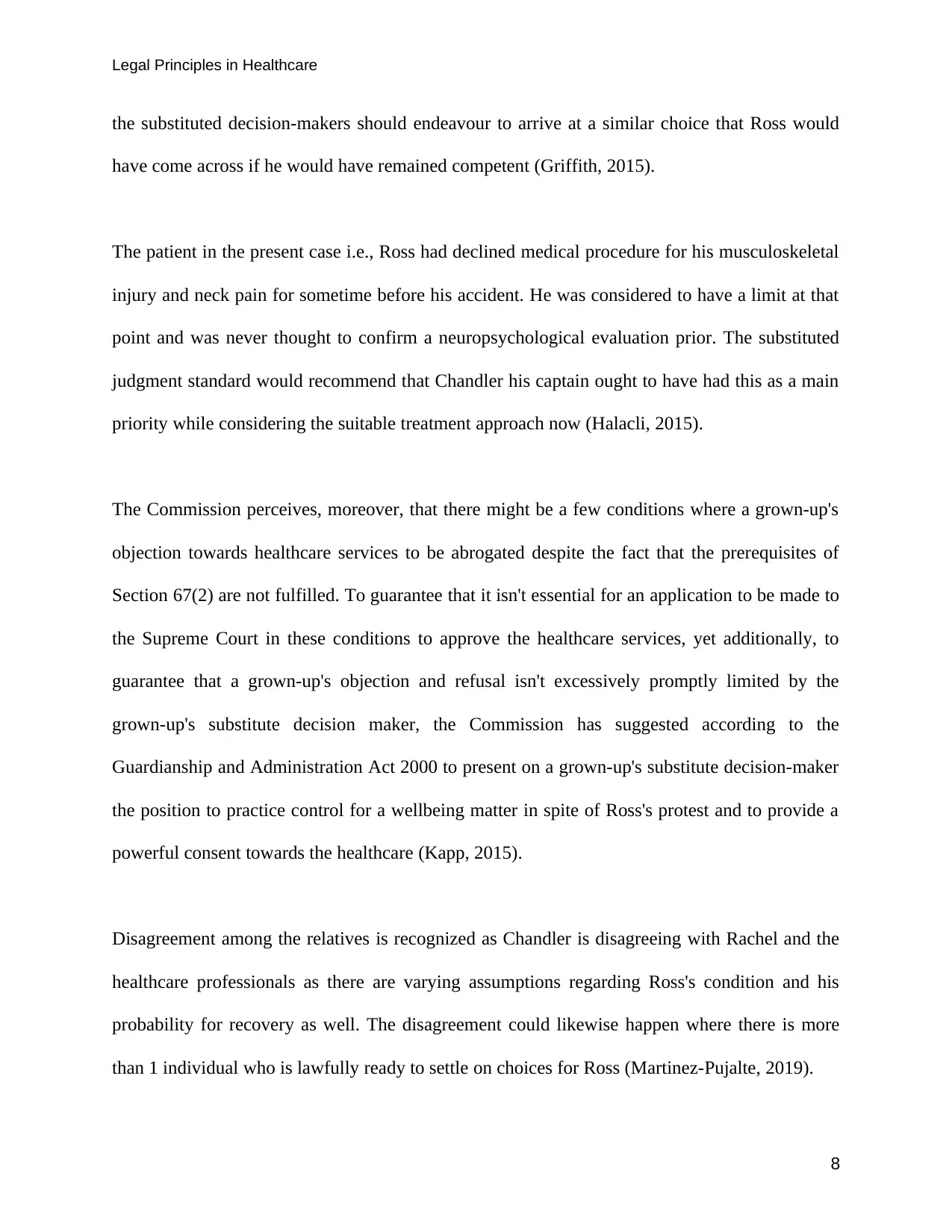
Legal Principles in Healthcare
the substituted decision-makers should endeavour to arrive at a similar choice that Ross would
have come across if he would have remained competent (Griffith, 2015).
The patient in the present case i.e., Ross had declined medical procedure for his musculoskeletal
injury and neck pain for sometime before his accident. He was considered to have a limit at that
point and was never thought to confirm a neuropsychological evaluation prior. The substituted
judgment standard would recommend that Chandler his captain ought to have had this as a main
priority while considering the suitable treatment approach now (Halacli, 2015).
The Commission perceives, moreover, that there might be a few conditions where a grown-up's
objection towards healthcare services to be abrogated despite the fact that the prerequisites of
Section 67(2) are not fulfilled. To guarantee that it isn't essential for an application to be made to
the Supreme Court in these conditions to approve the healthcare services, yet additionally, to
guarantee that a grown-up's objection and refusal isn't excessively promptly limited by the
grown-up's substitute decision maker, the Commission has suggested according to the
Guardianship and Administration Act 2000 to present on a grown-up's substitute decision-maker
the position to practice control for a wellbeing matter in spite of Ross's protest and to provide a
powerful consent towards the healthcare (Kapp, 2015).
Disagreement among the relatives is recognized as Chandler is disagreeing with Rachel and the
healthcare professionals as there are varying assumptions regarding Ross's condition and his
probability for recovery as well. The disagreement could likewise happen where there is more
than 1 individual who is lawfully ready to settle on choices for Ross (Martinez-Pujalte, 2019).
8
the substituted decision-makers should endeavour to arrive at a similar choice that Ross would
have come across if he would have remained competent (Griffith, 2015).
The patient in the present case i.e., Ross had declined medical procedure for his musculoskeletal
injury and neck pain for sometime before his accident. He was considered to have a limit at that
point and was never thought to confirm a neuropsychological evaluation prior. The substituted
judgment standard would recommend that Chandler his captain ought to have had this as a main
priority while considering the suitable treatment approach now (Halacli, 2015).
The Commission perceives, moreover, that there might be a few conditions where a grown-up's
objection towards healthcare services to be abrogated despite the fact that the prerequisites of
Section 67(2) are not fulfilled. To guarantee that it isn't essential for an application to be made to
the Supreme Court in these conditions to approve the healthcare services, yet additionally, to
guarantee that a grown-up's objection and refusal isn't excessively promptly limited by the
grown-up's substitute decision maker, the Commission has suggested according to the
Guardianship and Administration Act 2000 to present on a grown-up's substitute decision-maker
the position to practice control for a wellbeing matter in spite of Ross's protest and to provide a
powerful consent towards the healthcare (Kapp, 2015).
Disagreement among the relatives is recognized as Chandler is disagreeing with Rachel and the
healthcare professionals as there are varying assumptions regarding Ross's condition and his
probability for recovery as well. The disagreement could likewise happen where there is more
than 1 individual who is lawfully ready to settle on choices for Ross (Martinez-Pujalte, 2019).
8
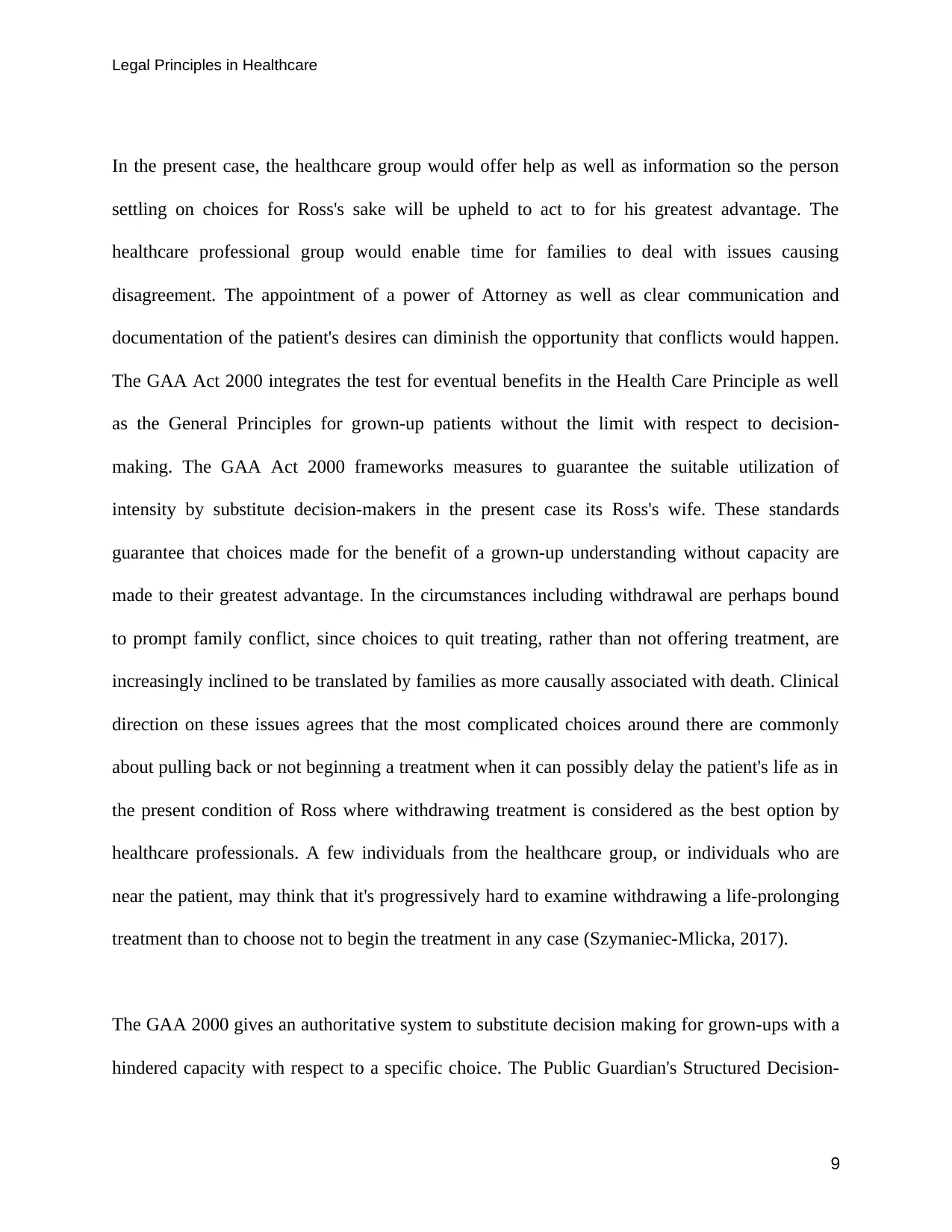
Legal Principles in Healthcare
In the present case, the healthcare group would offer help as well as information so the person
settling on choices for Ross's sake will be upheld to act to for his greatest advantage. The
healthcare professional group would enable time for families to deal with issues causing
disagreement. The appointment of a power of Attorney as well as clear communication and
documentation of the patient's desires can diminish the opportunity that conflicts would happen.
The GAA Act 2000 integrates the test for eventual benefits in the Health Care Principle as well
as the General Principles for grown-up patients without the limit with respect to decision-
making. The GAA Act 2000 frameworks measures to guarantee the suitable utilization of
intensity by substitute decision-makers in the present case its Ross's wife. These standards
guarantee that choices made for the benefit of a grown-up understanding without capacity are
made to their greatest advantage. In the circumstances including withdrawal are perhaps bound
to prompt family conflict, since choices to quit treating, rather than not offering treatment, are
increasingly inclined to be translated by families as more causally associated with death. Clinical
direction on these issues agrees that the most complicated choices around there are commonly
about pulling back or not beginning a treatment when it can possibly delay the patient's life as in
the present condition of Ross where withdrawing treatment is considered as the best option by
healthcare professionals. A few individuals from the healthcare group, or individuals who are
near the patient, may think that it's progressively hard to examine withdrawing a life-prolonging
treatment than to choose not to begin the treatment in any case (Szymaniec-Mlicka, 2017).
The GAA 2000 gives an authoritative system to substitute decision making for grown-ups with a
hindered capacity with respect to a specific choice. The Public Guardian's Structured Decision-
9
In the present case, the healthcare group would offer help as well as information so the person
settling on choices for Ross's sake will be upheld to act to for his greatest advantage. The
healthcare professional group would enable time for families to deal with issues causing
disagreement. The appointment of a power of Attorney as well as clear communication and
documentation of the patient's desires can diminish the opportunity that conflicts would happen.
The GAA Act 2000 integrates the test for eventual benefits in the Health Care Principle as well
as the General Principles for grown-up patients without the limit with respect to decision-
making. The GAA Act 2000 frameworks measures to guarantee the suitable utilization of
intensity by substitute decision-makers in the present case its Ross's wife. These standards
guarantee that choices made for the benefit of a grown-up understanding without capacity are
made to their greatest advantage. In the circumstances including withdrawal are perhaps bound
to prompt family conflict, since choices to quit treating, rather than not offering treatment, are
increasingly inclined to be translated by families as more causally associated with death. Clinical
direction on these issues agrees that the most complicated choices around there are commonly
about pulling back or not beginning a treatment when it can possibly delay the patient's life as in
the present condition of Ross where withdrawing treatment is considered as the best option by
healthcare professionals. A few individuals from the healthcare group, or individuals who are
near the patient, may think that it's progressively hard to examine withdrawing a life-prolonging
treatment than to choose not to begin the treatment in any case (Szymaniec-Mlicka, 2017).
The GAA 2000 gives an authoritative system to substitute decision making for grown-ups with a
hindered capacity with respect to a specific choice. The Public Guardian's Structured Decision-
9
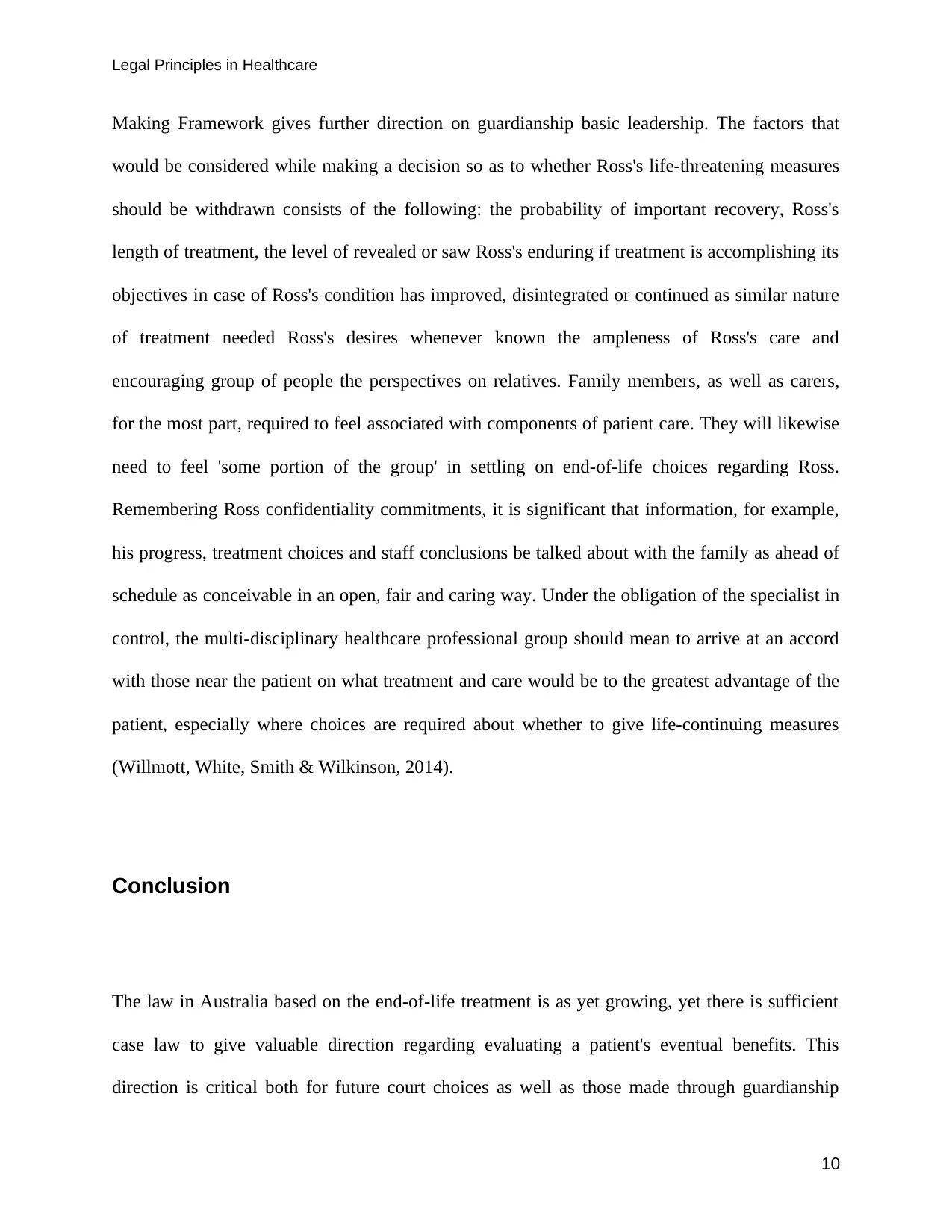
Legal Principles in Healthcare
Making Framework gives further direction on guardianship basic leadership. The factors that
would be considered while making a decision so as to whether Ross's life-threatening measures
should be withdrawn consists of the following: the probability of important recovery, Ross's
length of treatment, the level of revealed or saw Ross's enduring if treatment is accomplishing its
objectives in case of Ross's condition has improved, disintegrated or continued as similar nature
of treatment needed Ross's desires whenever known the ampleness of Ross's care and
encouraging group of people the perspectives on relatives. Family members, as well as carers,
for the most part, required to feel associated with components of patient care. They will likewise
need to feel 'some portion of the group' in settling on end-of-life choices regarding Ross.
Remembering Ross confidentiality commitments, it is significant that information, for example,
his progress, treatment choices and staff conclusions be talked about with the family as ahead of
schedule as conceivable in an open, fair and caring way. Under the obligation of the specialist in
control, the multi-disciplinary healthcare professional group should mean to arrive at an accord
with those near the patient on what treatment and care would be to the greatest advantage of the
patient, especially where choices are required about whether to give life-continuing measures
(Willmott, White, Smith & Wilkinson, 2014).
Conclusion
The law in Australia based on the end-of-life treatment is as yet growing, yet there is sufficient
case law to give valuable direction regarding evaluating a patient's eventual benefits. This
direction is critical both for future court choices as well as those made through guardianship
10
Making Framework gives further direction on guardianship basic leadership. The factors that
would be considered while making a decision so as to whether Ross's life-threatening measures
should be withdrawn consists of the following: the probability of important recovery, Ross's
length of treatment, the level of revealed or saw Ross's enduring if treatment is accomplishing its
objectives in case of Ross's condition has improved, disintegrated or continued as similar nature
of treatment needed Ross's desires whenever known the ampleness of Ross's care and
encouraging group of people the perspectives on relatives. Family members, as well as carers,
for the most part, required to feel associated with components of patient care. They will likewise
need to feel 'some portion of the group' in settling on end-of-life choices regarding Ross.
Remembering Ross confidentiality commitments, it is significant that information, for example,
his progress, treatment choices and staff conclusions be talked about with the family as ahead of
schedule as conceivable in an open, fair and caring way. Under the obligation of the specialist in
control, the multi-disciplinary healthcare professional group should mean to arrive at an accord
with those near the patient on what treatment and care would be to the greatest advantage of the
patient, especially where choices are required about whether to give life-continuing measures
(Willmott, White, Smith & Wilkinson, 2014).
Conclusion
The law in Australia based on the end-of-life treatment is as yet growing, yet there is sufficient
case law to give valuable direction regarding evaluating a patient's eventual benefits. This
direction is critical both for future court choices as well as those made through guardianship
10
Secure Best Marks with AI Grader
Need help grading? Try our AI Grader for instant feedback on your assignments.
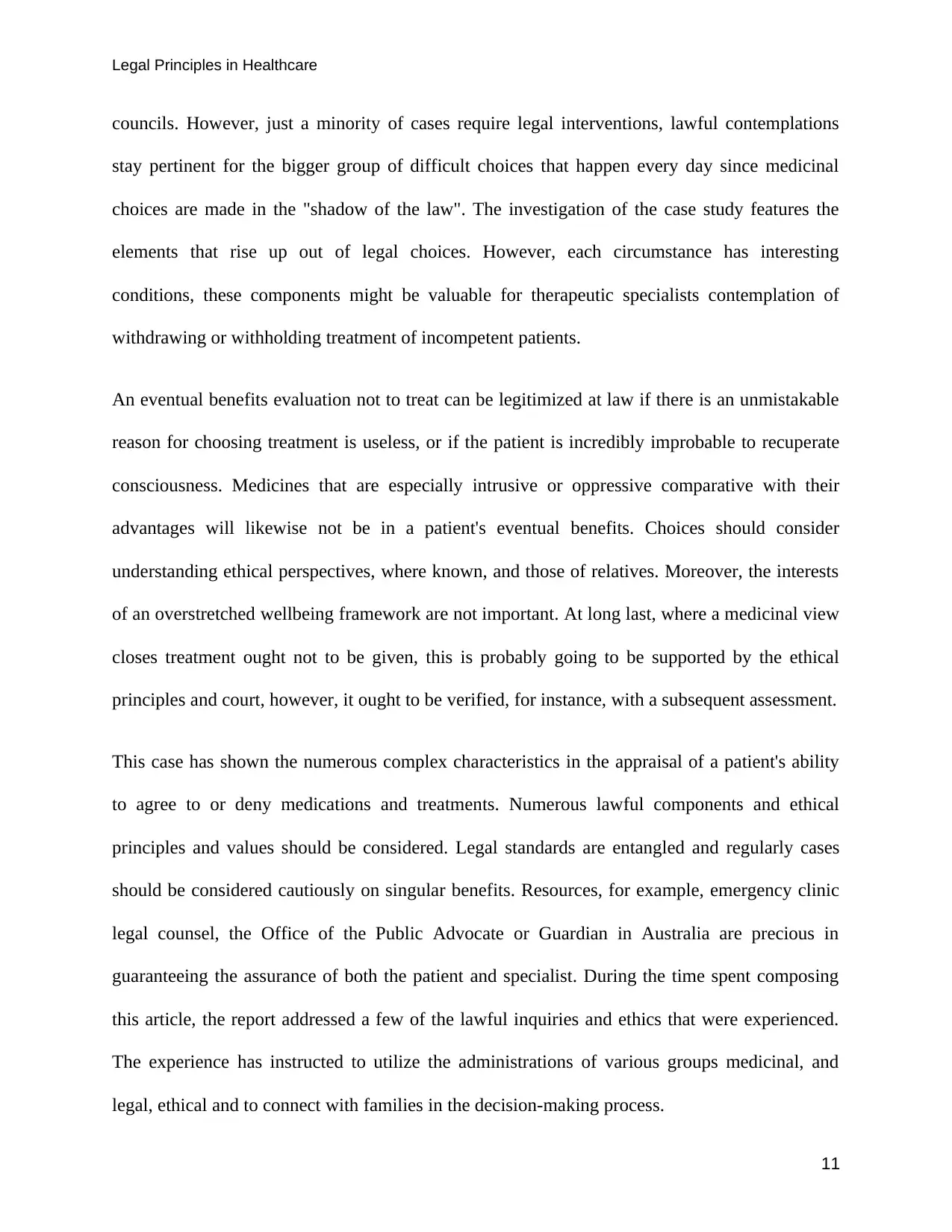
Legal Principles in Healthcare
councils. However, just a minority of cases require legal interventions, lawful contemplations
stay pertinent for the bigger group of difficult choices that happen every day since medicinal
choices are made in the "shadow of the law". The investigation of the case study features the
elements that rise up out of legal choices. However, each circumstance has interesting
conditions, these components might be valuable for therapeutic specialists contemplation of
withdrawing or withholding treatment of incompetent patients.
An eventual benefits evaluation not to treat can be legitimized at law if there is an unmistakable
reason for choosing treatment is useless, or if the patient is incredibly improbable to recuperate
consciousness. Medicines that are especially intrusive or oppressive comparative with their
advantages will likewise not be in a patient's eventual benefits. Choices should consider
understanding ethical perspectives, where known, and those of relatives. Moreover, the interests
of an overstretched wellbeing framework are not important. At long last, where a medicinal view
closes treatment ought not to be given, this is probably going to be supported by the ethical
principles and court, however, it ought to be verified, for instance, with a subsequent assessment.
This case has shown the numerous complex characteristics in the appraisal of a patient's ability
to agree to or deny medications and treatments. Numerous lawful components and ethical
principles and values should be considered. Legal standards are entangled and regularly cases
should be considered cautiously on singular benefits. Resources, for example, emergency clinic
legal counsel, the Office of the Public Advocate or Guardian in Australia are precious in
guaranteeing the assurance of both the patient and specialist. During the time spent composing
this article, the report addressed a few of the lawful inquiries and ethics that were experienced.
The experience has instructed to utilize the administrations of various groups medicinal, and
legal, ethical and to connect with families in the decision-making process.
11
councils. However, just a minority of cases require legal interventions, lawful contemplations
stay pertinent for the bigger group of difficult choices that happen every day since medicinal
choices are made in the "shadow of the law". The investigation of the case study features the
elements that rise up out of legal choices. However, each circumstance has interesting
conditions, these components might be valuable for therapeutic specialists contemplation of
withdrawing or withholding treatment of incompetent patients.
An eventual benefits evaluation not to treat can be legitimized at law if there is an unmistakable
reason for choosing treatment is useless, or if the patient is incredibly improbable to recuperate
consciousness. Medicines that are especially intrusive or oppressive comparative with their
advantages will likewise not be in a patient's eventual benefits. Choices should consider
understanding ethical perspectives, where known, and those of relatives. Moreover, the interests
of an overstretched wellbeing framework are not important. At long last, where a medicinal view
closes treatment ought not to be given, this is probably going to be supported by the ethical
principles and court, however, it ought to be verified, for instance, with a subsequent assessment.
This case has shown the numerous complex characteristics in the appraisal of a patient's ability
to agree to or deny medications and treatments. Numerous lawful components and ethical
principles and values should be considered. Legal standards are entangled and regularly cases
should be considered cautiously on singular benefits. Resources, for example, emergency clinic
legal counsel, the Office of the Public Advocate or Guardian in Australia are precious in
guaranteeing the assurance of both the patient and specialist. During the time spent composing
this article, the report addressed a few of the lawful inquiries and ethics that were experienced.
The experience has instructed to utilize the administrations of various groups medicinal, and
legal, ethical and to connect with families in the decision-making process.
11
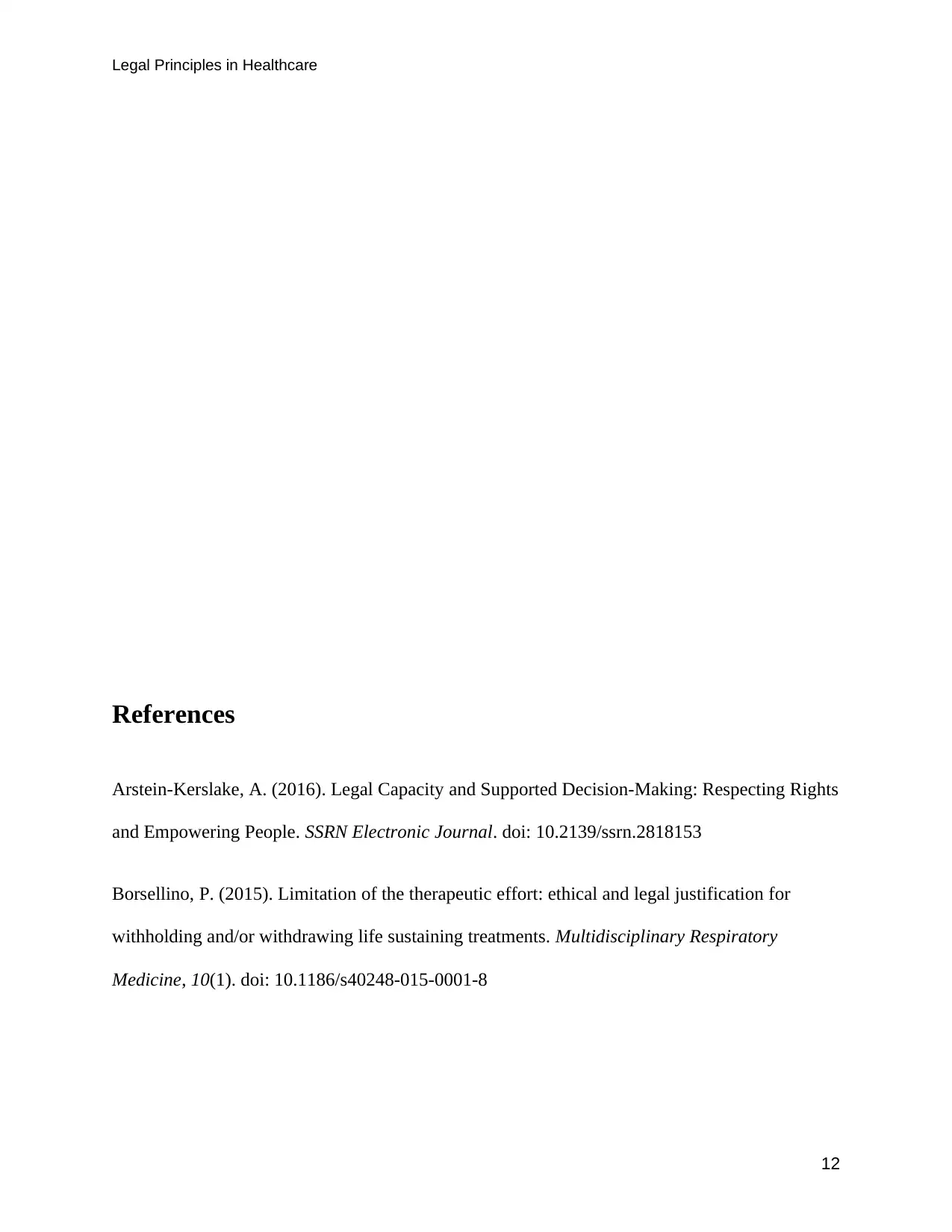
Legal Principles in Healthcare
References
Arstein-Kerslake, A. (2016). Legal Capacity and Supported Decision-Making: Respecting Rights
and Empowering People. SSRN Electronic Journal. doi: 10.2139/ssrn.2818153
Borsellino, P. (2015). Limitation of the therapeutic effort: ethical and legal justification for
withholding and/or withdrawing life sustaining treatments. Multidisciplinary Respiratory
Medicine, 10(1). doi: 10.1186/s40248-015-0001-8
12
References
Arstein-Kerslake, A. (2016). Legal Capacity and Supported Decision-Making: Respecting Rights
and Empowering People. SSRN Electronic Journal. doi: 10.2139/ssrn.2818153
Borsellino, P. (2015). Limitation of the therapeutic effort: ethical and legal justification for
withholding and/or withdrawing life sustaining treatments. Multidisciplinary Respiratory
Medicine, 10(1). doi: 10.1186/s40248-015-0001-8
12
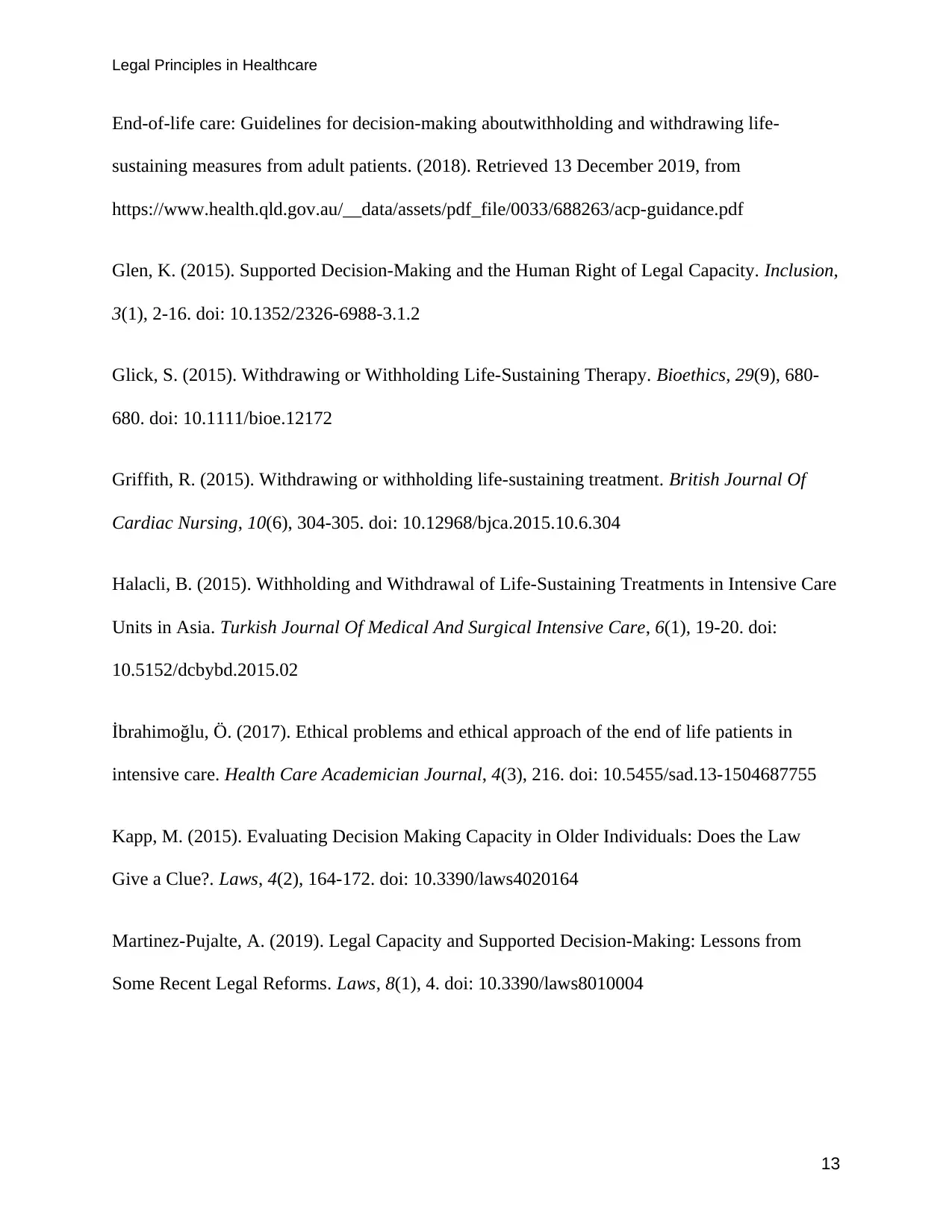
Legal Principles in Healthcare
End-of-life care: Guidelines for decision-making aboutwithholding and withdrawing life-
sustaining measures from adult patients. (2018). Retrieved 13 December 2019, from
https://www.health.qld.gov.au/__data/assets/pdf_file/0033/688263/acp-guidance.pdf
Glen, K. (2015). Supported Decision-Making and the Human Right of Legal Capacity. Inclusion,
3(1), 2-16. doi: 10.1352/2326-6988-3.1.2
Glick, S. (2015). Withdrawing or Withholding Life-Sustaining Therapy. Bioethics, 29(9), 680-
680. doi: 10.1111/bioe.12172
Griffith, R. (2015). Withdrawing or withholding life-sustaining treatment. British Journal Of
Cardiac Nursing, 10(6), 304-305. doi: 10.12968/bjca.2015.10.6.304
Halacli, B. (2015). Withholding and Withdrawal of Life-Sustaining Treatments in Intensive Care
Units in Asia. Turkish Journal Of Medical And Surgical Intensive Care, 6(1), 19-20. doi:
10.5152/dcbybd.2015.02
İbrahimoğlu, Ö. (2017). Ethical problems and ethical approach of the end of life patients in
intensive care. Health Care Academician Journal, 4(3), 216. doi: 10.5455/sad.13-1504687755
Kapp, M. (2015). Evaluating Decision Making Capacity in Older Individuals: Does the Law
Give a Clue?. Laws, 4(2), 164-172. doi: 10.3390/laws4020164
Martinez-Pujalte, A. (2019). Legal Capacity and Supported Decision-Making: Lessons from
Some Recent Legal Reforms. Laws, 8(1), 4. doi: 10.3390/laws8010004
13
End-of-life care: Guidelines for decision-making aboutwithholding and withdrawing life-
sustaining measures from adult patients. (2018). Retrieved 13 December 2019, from
https://www.health.qld.gov.au/__data/assets/pdf_file/0033/688263/acp-guidance.pdf
Glen, K. (2015). Supported Decision-Making and the Human Right of Legal Capacity. Inclusion,
3(1), 2-16. doi: 10.1352/2326-6988-3.1.2
Glick, S. (2015). Withdrawing or Withholding Life-Sustaining Therapy. Bioethics, 29(9), 680-
680. doi: 10.1111/bioe.12172
Griffith, R. (2015). Withdrawing or withholding life-sustaining treatment. British Journal Of
Cardiac Nursing, 10(6), 304-305. doi: 10.12968/bjca.2015.10.6.304
Halacli, B. (2015). Withholding and Withdrawal of Life-Sustaining Treatments in Intensive Care
Units in Asia. Turkish Journal Of Medical And Surgical Intensive Care, 6(1), 19-20. doi:
10.5152/dcbybd.2015.02
İbrahimoğlu, Ö. (2017). Ethical problems and ethical approach of the end of life patients in
intensive care. Health Care Academician Journal, 4(3), 216. doi: 10.5455/sad.13-1504687755
Kapp, M. (2015). Evaluating Decision Making Capacity in Older Individuals: Does the Law
Give a Clue?. Laws, 4(2), 164-172. doi: 10.3390/laws4020164
Martinez-Pujalte, A. (2019). Legal Capacity and Supported Decision-Making: Lessons from
Some Recent Legal Reforms. Laws, 8(1), 4. doi: 10.3390/laws8010004
13
Paraphrase This Document
Need a fresh take? Get an instant paraphrase of this document with our AI Paraphraser
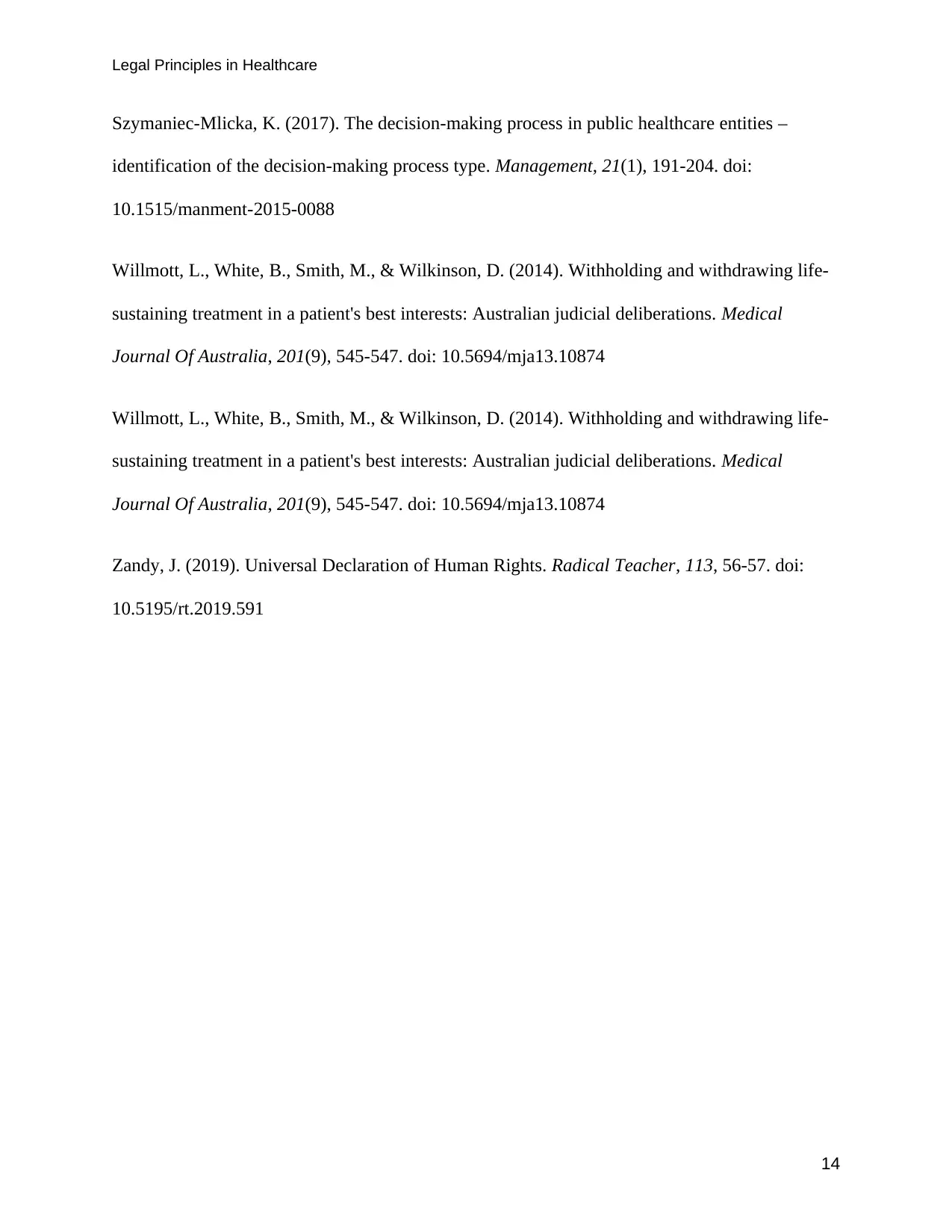
Legal Principles in Healthcare
Szymaniec-Mlicka, K. (2017). The decision-making process in public healthcare entities –
identification of the decision-making process type. Management, 21(1), 191-204. doi:
10.1515/manment-2015-0088
Willmott, L., White, B., Smith, M., & Wilkinson, D. (2014). Withholding and withdrawing life‐
sustaining treatment in a patient's best interests: Australian judicial deliberations. Medical
Journal Of Australia, 201(9), 545-547. doi: 10.5694/mja13.10874
Willmott, L., White, B., Smith, M., & Wilkinson, D. (2014). Withholding and withdrawing life‐
sustaining treatment in a patient's best interests: Australian judicial deliberations. Medical
Journal Of Australia, 201(9), 545-547. doi: 10.5694/mja13.10874
Zandy, J. (2019). Universal Declaration of Human Rights. Radical Teacher, 113, 56-57. doi:
10.5195/rt.2019.591
14
Szymaniec-Mlicka, K. (2017). The decision-making process in public healthcare entities –
identification of the decision-making process type. Management, 21(1), 191-204. doi:
10.1515/manment-2015-0088
Willmott, L., White, B., Smith, M., & Wilkinson, D. (2014). Withholding and withdrawing life‐
sustaining treatment in a patient's best interests: Australian judicial deliberations. Medical
Journal Of Australia, 201(9), 545-547. doi: 10.5694/mja13.10874
Willmott, L., White, B., Smith, M., & Wilkinson, D. (2014). Withholding and withdrawing life‐
sustaining treatment in a patient's best interests: Australian judicial deliberations. Medical
Journal Of Australia, 201(9), 545-547. doi: 10.5694/mja13.10874
Zandy, J. (2019). Universal Declaration of Human Rights. Radical Teacher, 113, 56-57. doi:
10.5195/rt.2019.591
14
1 out of 14
Related Documents
Your All-in-One AI-Powered Toolkit for Academic Success.
+13062052269
info@desklib.com
Available 24*7 on WhatsApp / Email
![[object Object]](/_next/static/media/star-bottom.7253800d.svg)
Unlock your academic potential
© 2024 | Zucol Services PVT LTD | All rights reserved.





